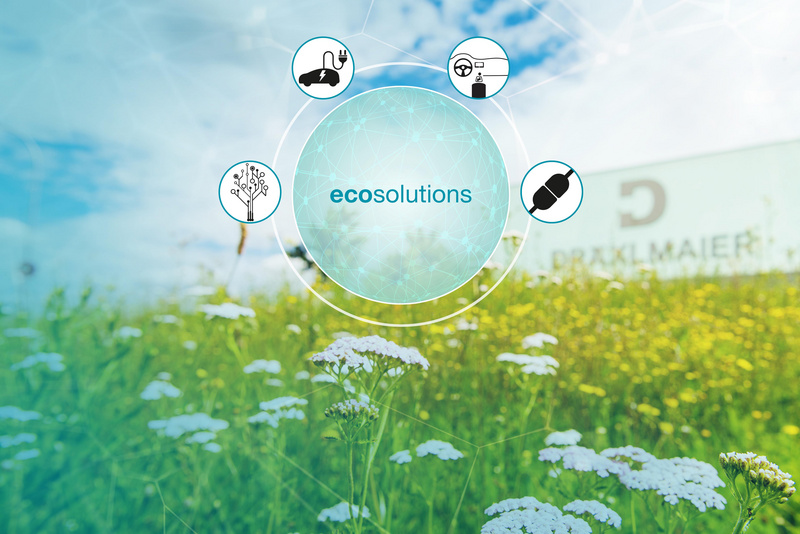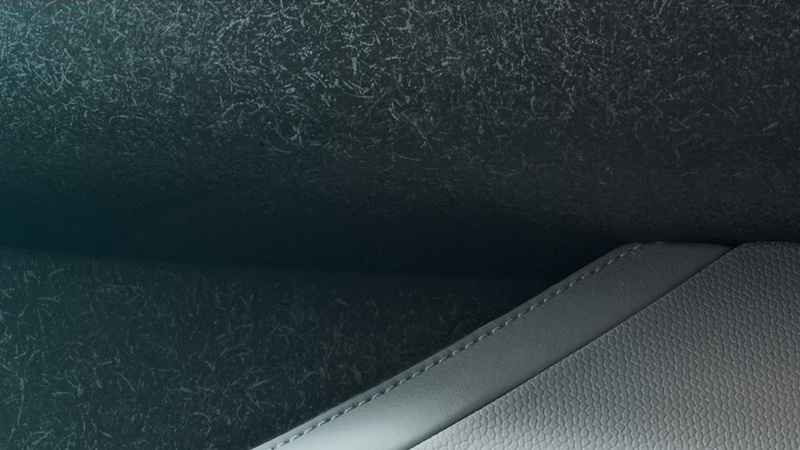In figures
87 percent
of the freely negotiable purchasing volume is covered by suppliers who have achieved “green” status in the “Sustainability” category of the supplier evaluation.
100 percent
of our products can be labeled with the Product Carbon Footprint.
14.8 percent
recycled materials in purchased plastic granulates in the Component Systems and Interior Systems segments in 2023.
DRÄXLMAIER Group ecosolutions
We carefully examine our products and want to integrate ecological aspects into the entire value chain.
With our ecosolutions programme, we strive to integrate environmental factors along the entire value chain. In 2021, we developed the programme further to include other areas of responsibility in addition to development, giving us an even more holistic view of the way in which our products are created. Optimising these processes provides a lever for more sustainability, in particular in terms of climate and environmental protection – from the very first product idea, the design, development and application, right through to spare parts. That means we can offer our customers environmentally-friendly solutions. At the same time, we can make an important contribution to the sustainable development of the automotive industry.

Ecological product design
This also goes for our products: We want to use resources as efficiently as possible and minimize greenhouse gas emissions (CO2e).
We aim to utilise resources as efficiently as possible and minimise greenhouse gas emissions (CO2e). To this end, we are always searching for ways to reduce pollutant emissions and improve energy efficiency. At the same time, we want to reduce the use of materials in product manufacturing, increase product recyclability and dismantlability and maximise the use of reusable materials to minimise our environmental footprint.
Back in 2021, we developed a method for calculating the CO2e footprint of our products. In 2022, we applied the methodology in several calculation tools. The insights gained in this way provide us with key decision-making criteria, enabling us to step up our product sustainability even further. Our customers benefit from this approach because we are always able to offer them more ecological product alternatives as well as important decision-making aids for the sustainable design of their own products.
We want to minimise resource and energy use as much as possible in manufacturing our products. That is why we are continually endeavouring to optimise our processes. Close, cross-functional cooperation – particularly among Purchasing, Development, Production, Logistics and Sales – will play a key role in our success.

Sustainability in the supply chain
By aligning our supply chains sustainably, we want to fulfil both economic requirements and our environmental and social responsibility – across our entire value chain. As such, we are working on the assumption that our suppliers value sustainability just as highly as we do.
Developing more sustainable products also means measuring the components and services we buy against the same standards we set ourselves. As such, one of the core goals ofour strategy is to develop sustainability in the supplier network, thereby supporting product sustainability across the board.
A large proportion of the Scope 3 CO2e emissions are generated during the production of parts purchased by DRÄXLMAIER. In order to leverage this potential for climate protection, DRÄXLMAIER works closely with the relevant suppliers during product development and operates a consistent supplier management system. We are also involved in initiatives to promote uniform sustainability standards throughout the whole supplier network and to establish review mechanisms, for example in the extraction and processing of critical raw materials.
Purchasing at DRÄXLMAIER operates at various levels: in Procurement Governance, standardised measures ensure the step-by-step implementation of more sustainable services, materials and processes. To this end, we have established an efficient system of rules, structures and processes within the Group. By purchasing energy from renewable resources and complying with legal requirements, such as the German Supply Chain Act (LkSG), DRÄXLMAIER also supports its customers in meeting their sustainability goals.
